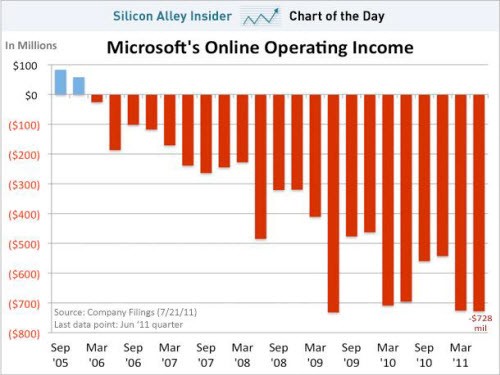Another quarter. Repeat the story. Google? Record quarterly revenues. Apple? Record revenues and profits. Again. Microsoft? Record revenues.
Clearly the boom is on. The bubble is inflating. With moves like Google’s launch of their own social network Google+, the corporate elephants are now engaged in a highly-competitive dance around a massive pot of gold.
Google chairman Eric Schmidt reckons four companies now dominate consumer technology: Google, Apple, Amazon and Facebook. The first two we’ve mentioned. Amazon’s results will be announced 26 July. Facebook isn’t a public company, but we know it’s growing like crazy.
Where’s Microsoft?
“Microsoft is not driving the consumer revolution in the minds of the consumers,” Schmidt said in May. We can debate who is fifth and sixth, he said, mentioning PayPal and Twitter, but not Microsoft.
Yet surely any massive growth will come from consumers, especially the vast numbers of newly middle class consumers in the rapidly-growing BRIC economies?
And surely the massive growth is online? Have you heard about the internet? Apparently it’s huge!
But as Business Insider reported, Microsoft’s online division reported yet another massive operating loss this quarter. A cool US$728 million.

“For the twelve-month period ending in June 30, 2011, Microsoft’s online division has lost $2.6 billion,” BI wrote. “At some point Microsoft will get this turned around, right?”
It will all come down to strategy. So I listened closely to Microsoft’s earnings call for some signs.
Wall Street analysts focus on the short term. It’s all about their spreadsheet, row 175 column 18 and the potential variability in the company’s forecasts. They heard lots of reassurance about the big firms liking Microsoft’s roadmap, that 25% of enterprise desktops are already running Windows 7 and 90% of enterprises have committed to it.
So much of Microsoft’s revenue growth will come from the enterprise. “It goes back to that strength we’re seeing in selling multi-year licensing agreements and the demand we’re seeing for the products that are across the portfolios of the business divisions,” said one of the smiling, buzzword-vomiting execs.
What I’m not hearing, though, is the bold vision. The spectacular, athletic dance move that’ll impress the judges.
Multi-year licensing agreements? WTF? The world is moving to pay-as-you-go services in the cloud. Microsoft’s customers are still clinging to the reassurances of the past.
As Amazon’s chief technology officer Dr Werner Vogels told me only a week ago, the cloud has levelled the playing field. Ten years ago a start-up needed $5 million, he said. Now it’s “just $50,000 and a coffee shop around the corner”.
Amazon’s strategy is clear. Provide basic computing services (“compute units”) on a massive scale charging commodity prices, and run a ginormous shop. So is Facebook’s. Suck up all your personal data and mine it for advertisers. So is Google’s. Ditto, plus cloud applications. So is Apple’s. MOAR IPHONES AND IPADZ! I’m seeing healthy differences. These companies are finding their own niches in some areas and competing head-on in others.
But Microsoft’s?
Microsoft’s strategy seems to be to continue their plod. Last quarter I wrote that Microsoft seemed tired. Have they scoffed the Red Bull yet?
Here’s two disturbing signs.
“We’re totally aligned with Yahoo!”, a senior Microsoft executive told the earnings call. But Yahoo! delivered an “unsatisfactory” quarter according to its own CEO, Carol Bartz. The company’s revenues haven’t merely flatlined since she took over, they’ve dwindled.
Microsoft is also aligned with Nokia, following February’s announcement that Nokia would drop its own Symbian and MeeGo operating systems and instead run Windows Phone 7, plus other technology mergers. Since then Apple has surpassed Nokia as the world’s leading smartphone manufacturer by volume, and analyst consensus is that Google’s open source Android operating system will demolish them both.
Nokia announced a net quarterly loss of US$522 million this week.
“The challenges we are facing during our strategic transformation manifested in a greater than expected way,” the company said. Too effing right.
Dear Microsoft, how do you expect to dance the dance more nimbly if you strap yourself to cripples? You do know this dance is called Musical Chairs, right? The music won’t last forever.








Wake up LEROY !!
Hey Leroy, where’s the chart?
LEROY [If you want to use the chart, this is where it goes.]
ummmm?
The problem with Microsoft is that they are unsure which way to go. Do we focus on consumer (xbox, devices, online), go with cloud (Azure…which is in the Server and Tools division) or stay true to the traditional strength, business products (windows/office/server)?
In my opinion, it’s xbox, devices and Azure which will be the main drivers for growth for Microsoft over the next 5 years. The Business products, while no doubt on the downhill slide, will still provide them with plenty of revenue over the next few years. It’s a mature business. In this regard, Microsoft’s advantage over open source is the same as IBM’s…those Multi-year licensing agreements that you are disgusted with. They usually come tied with support agreements. Businesses like the certainty of being able to call a number to help them out when software crashes.
If i were them, I would ditch their online division and merge BING (the only jewel there) into the server/tools division.
“analyst consensus is that Google’s open source Android operating system will demolish them both.”
There is no such analyst consensus. Don’t be embarrassing.